¿Qué tal? Hoy vuelvo después de un mes de inactividad por acá (aunque en @gabrielrr17 si he estado presente con Spl y algunos retos), para comentar mi progreso en un nuevo curso de AzulSchool. Para esta ocasión Python es el lenguaje elegido. De este he oído bastantes cosas buenas e incluso he escrito un artículo breve sobre el origen de su nombre.
How are you? Today I'm back after a month of inactivity here (although in @gabrielrr17 I have been present with Spl and some challenges), to comment on my progress in a new AzulSchool course. This time Python is the chosen language. I've heard a lot of good things about it and I've even written a short article about the origin of its name.
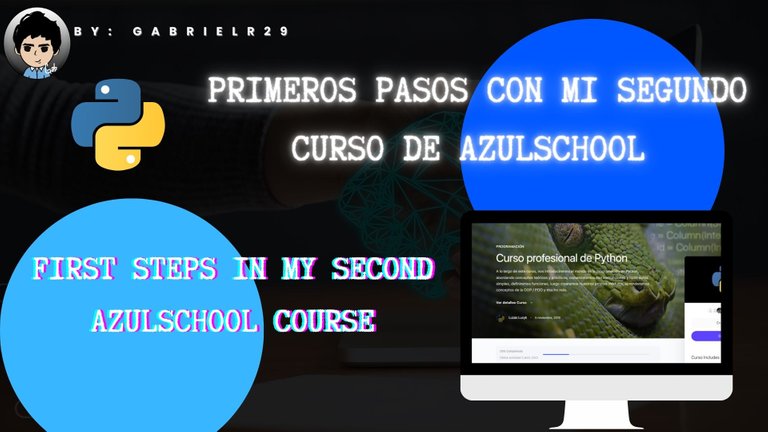

Hace poco obtuve acceso a una membresía de AzulSchool, por lo que pude optar a este curso de Python, pago, de la mano de Lucas Lucyk. He avanzado a pasos cortos, pues empecé justo cuando me quedaba poco para iniciar el nuevo semestre, pero me he propuesto aprovechar que terminé y tengo algunos días de respiro para avanzar un poco más y hacer el hábito.
Hasta ahora el contenido me ha parecido apasionante, considero que el lenguaje es mucho más llevadero en cuanto a sintaxis que C++. Confieso que todavía no me acostumbro al no tener que emplear el ";", aunque se puede añadir, realmente no resulta tan restrictivo que con C++ o Java.
Para el editor de código no he usado el clásico, recomendado al principio del curso, sino que he decidido emplear Visual Studio Code.
I recently got access to a membership of AzulSchool, so I could opt for this Python course, paid, by the hand of Lucas Lucyk. I have advanced in small steps, since I started just when I had little left to start the new semester, but I have decided to take advantage of the fact that I finished and I have some days of respite to advance a little more and make the habit.
So far I have found the content exciting, I consider that the language is much more bearable in terms of syntax than C++. I confess that I am still not used to not having to use the ";", although it can be added, it is not really as restrictive as with C++ or Java.
For the code editor I have not used the classic compiler, recommended at the beginning of the course, but I have decided to use Visual Studio Code.

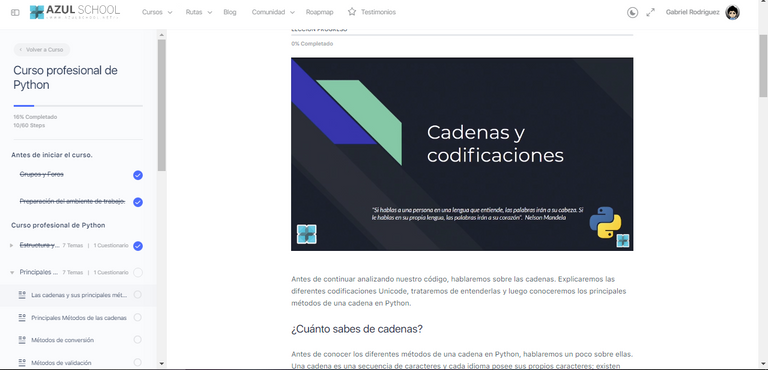
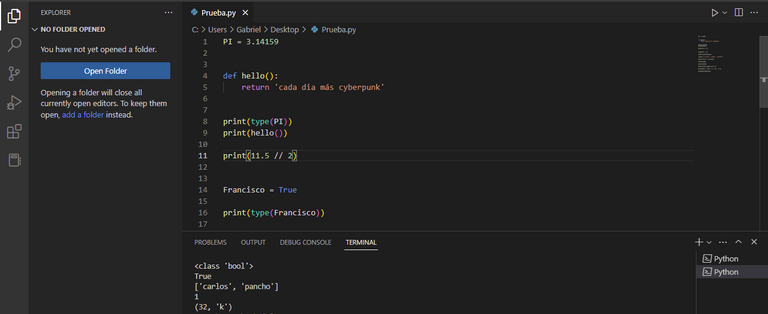

Para los ejercicios propuestos del segundo módulo "principales métodos del objeto string", me percaté que se enfocó en sacar provecho a cada método enseñado a lo largo del curso, cosa que está genial. Tan solo comentaría que, dar la solución justo debajo del ejercicio, le quita en cierta medida, la oportunidad de pensar la solución por un momento al estudiante. Sugeriría que estas soluciones estuvieran cubiertas junto a un botón que diga "revelar respuesta".
De esta forma, se da la oportunidad de que primero el estudiante se enfrasque en pensar y ejecutar posibles soluciones y luego comprobar su desempeño. Claramente se puede abusar, revelando la respuesta antes de tiempo, pero esto afectaría el desempeño en el examen y los propios resultados en el proceso de aprendizaje.
No hay mucho para destacar en cuanto a lo que hice, tan solo fueron conversiones, validaciones, uniones, divisiones y una prueba al apartado de codificaciones. El examen estuvo a muy buen nivel, saqué un 78% o 26/33 preguntas correctas, había preguntas que debí haber pensado con más cuidado antes de responder, pero bueno, son detalles a mejorar según vaya avanzando.
For the proposed exercises of the second module "main methods of the string object", I noticed that you focused on taking advantage of each method taught throughout the course, which is great. I would only comment that, giving the solution just below the exercise, takes away to some extent, the opportunity to think about the solution for a moment to the student. I would suggest that these solutions be covered next to a button that says "reveal answer".
In this way, it gives the student the opportunity to first engage in thinking about and executing possible solutions and then check their performance. Clearly it can be abused, revealing the answer prematurely, but this would affect performance on the exam and the learning process results themselves.
There is not much to highlight in terms of what I did, it was just conversions, validations, joins, splits and a test of the coding section. The exam was at a very good level, I got 78% or 26/33 questions correct, there were questions that I should have thought more carefully before answering, but well, these are details to improve as I progress.

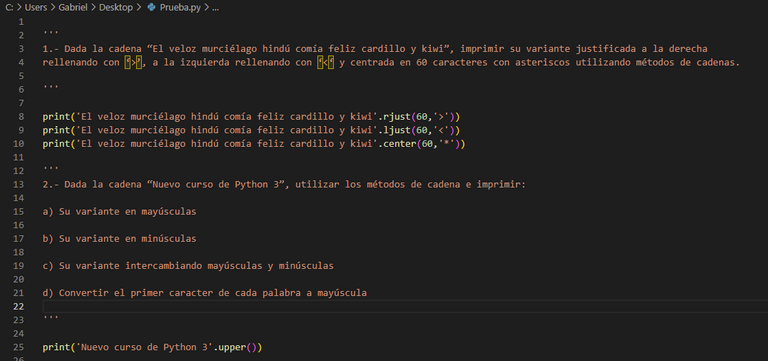
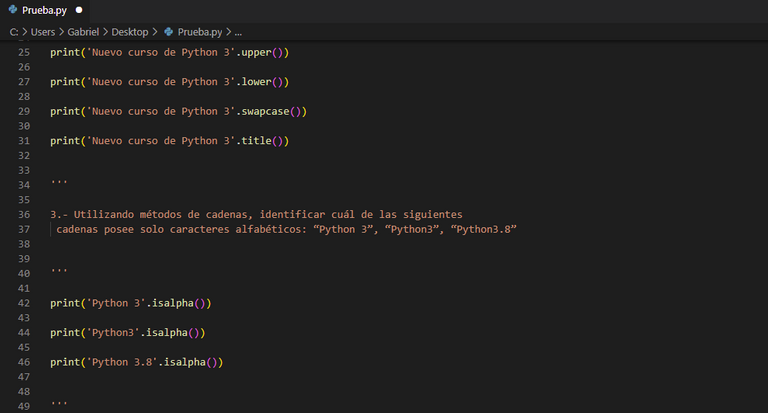
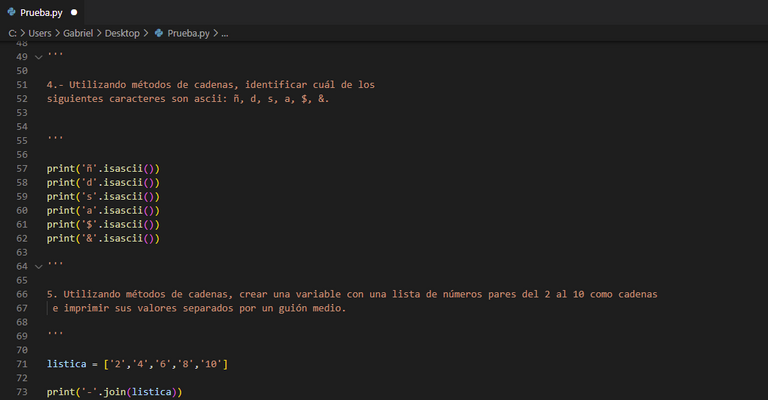
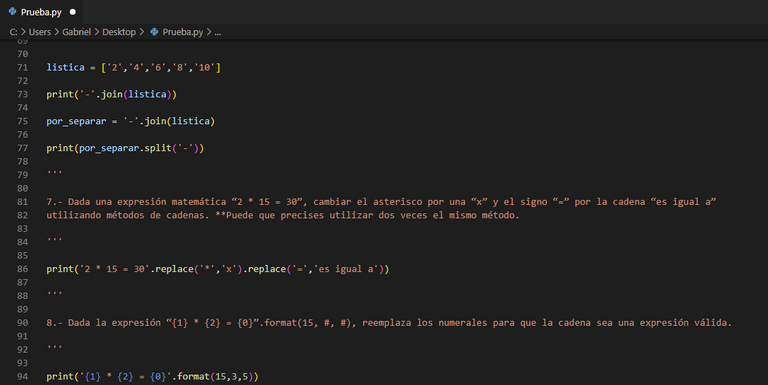
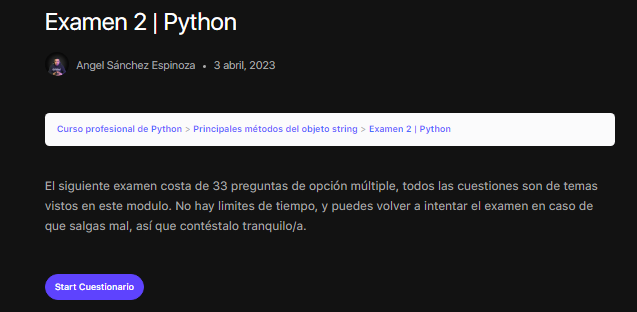
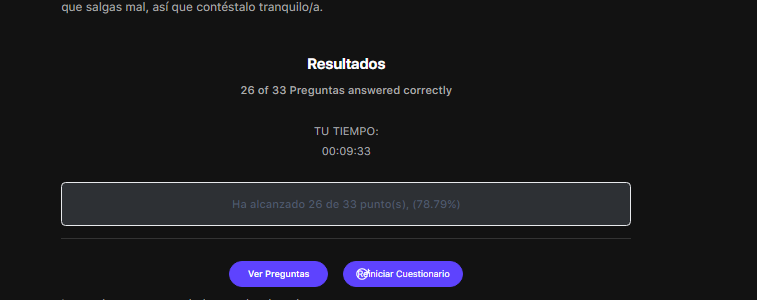

¡Y bueno... Eso es todo por hoy! Conforme siga avanzando en este curso, iré comentando mis experiencias. En este he notado que no hay múltiples proyectos como en el curso de C++ que comenté hace un tiempo, pero sí ejercicios propuestos y un único proyecto final que se divide en dos módulos.
And well... That's all for today! As I continue to progress in this course, I will comment on my experiences. In this one I have noticed that there are not multiple projects as in the C++ course I discussed some time ago, but there are proposed exercises and a single final project that is divided into two modules.







